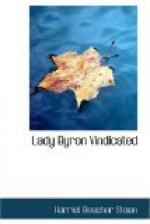’KIRKBY MALLORY, Feb. 14, 1816.
’The present sufferings of all may yet be repaid in blessings. Do not despair absolutely, dearest; and leave me but enough of your interest to afford you any consolation by partaking of that sorrow which I am most unhappy to cause thus unintentionally. You will be of my opinion hereafter; and at present your bitterest reproach would be forgiven, though Heaven knows you have considered me more than a thousand would have done,—more than anything but my affection for B., one most dear to you, could deserve. I must not remember these feelings. Farewell! God bless you from the bottom of my heart!
‘A. I. B.’
We are here to consider that Mrs. Leigh has stood to Lady Byron in all this long agony as her only confidante and friend; that she has denied the charges her brother has made, and referred them to insanity, admitting insane attempts upon herself which she has been obliged to watch over and control.
Lady Byron has come to the conclusion that Augusta is mistaken as to insanity; that there is a real wicked purpose and desire on the part of the brother, not as yet believed in by the sister. She regards the sister as one, who, though deceived and blinded, is still worthy of confidence and consideration; and so says to her, ’You will be of my opinion hereafter.’
She says, ‘You have considered me more than a thousand would have done.’ Mrs. Leigh is, in Lady Byron’s eyes, a most abused and innocent woman, who, to spare her sister in her delicate situation, has taken on herself the whole charge of a maniacal brother, although suffering from him language and actions of the most injurious kind. That Mrs. Leigh did not flee the house at once under such circumstances, and wholly decline the management of the case, seems to Lady Byron consideration and self-sacrifice greater than she can acknowledge.
The knowledge of the whole extent of the truth came to Lady Byron’s mind at a later period.
We now take up the history from Lushington’s letter to Lady Byron, published at the close of her statement.
The application to Lord Byron for an act of separation was positively refused at first; it being an important part of his policy that all the responsibility and insistence should come from his wife, and that he should appear forced into it contrary to his will.
Dr. Lushington, however, says to Lady Byron,—
’I was originally consulted by Lady Noel on your behalf while you were in the country. The circumstances detailed by her were such as justified a separation; but they were not of that aggravated description as to render such a measure indispensable. On Lady Noel’s representations, I deemed a reconciliation with Lord Byron practicable, and felt most sincerely a wish to aid in effecting it. There was not, on Lady Noel’s part, any exaggeration of the facts, nor, so far as I could perceive, any determination to prevent a return to Lord Byron: certainly none was expressed when I spoke of a reconciliation.’
In this crisis, with Lord Byron refusing the separation, with Lushington expressing a wish to aid in a reconciliation, and Lady Noel not expressing any aversion to it, the whole strain of the dreadful responsibility comes upon the wife.




